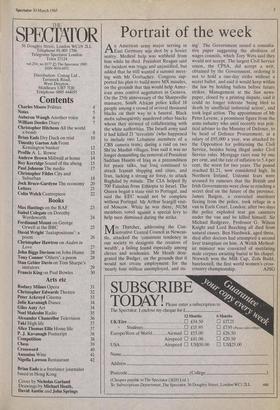Portrait of the week A n American army major serving in
East Germany was shot by a Soviet sentry. Medical help was withheld from him while he died. President Reagan said the incident was tragic and unjustified, but added that he still wanted a summit meet- ing with Mr Gorbachev. Congress sup- ported his plan to build more MX missiles, on the grounds that this would help Amer-. ican arms control negotiators in Geneva. On the 25th anniversary of the Sharpeville massacre, South African police killed 18 , people among a crowd of several thousand blacks on their way to a funeral. Black mobs subsequently murdered other blacks whom they accused of collaborating with the white authorities. The Israeli army said it had killed 21 `terrorists' (who happened to include two Lebanese members of a , CBS camera team) during a raid on two Shi'ite Muslim villages. Iran said it was no Ilonger demanding the removal of President 'Saddam Husein of Iraq as a precondition for peace talks, but Iraq continued to attack Iranian shipping and cities, and Iran, lacking a strong air, force, to attack Baghdad by missile. The CIA helped fly 700 Falashas from Ethiopia to Israel. The Queen began a state visit to Portugal, and said the EEC would not be complete without Portugal. Mr Arthur Scargill visit- ed Moscow. While he was there, NUM members voted against a special levy to help men dismissed during the strike.
Mrs Thatcher, addressing the Con- servative Central Council in Newcas- tle, attacked the 'consistent tendency in our society to denigrate the creators of wealth', a failing found especially among clerics and academics. Mr Heath deni- grated the Budget, on the grounds that it would not create employment for the 'nearly four million unemployed, and ris- ing'. The Government issued a consulta- tive paper suggesting the abolition of wages councils, which Tory Wets said they would not accept. The largest Civil Service union, the CPSA, did accept a writ, obtained by the Government, ordering it not to hold a one-day strike without a secret ballot, and said it would keep within the law by holding ballots before future strikes. Management at the Sun news- paper, closed by a printing dispute, said it could no longer tolerate 'being bled to death by unofficial industrial action', and took legal action. The appointment of Mr Peter Levene, a prominent figure from the arms industry who until recently was poli- tical adviser to the Minister of Defence, to be head of Defence Procurement, at a salary of £95,000 a year, was attacked by the Opposition for politicising the Civil Service, besides being illegal under Civil Service rules. Mortgage rates rose by one per cent, and the rate of inflation to 5.4 per cent, the worst for two years. The pound reached $1.21, now considered high. In Northern Ireland, Unionist fears were aroused by rumours that the British and Irish Governments were close to reaching a secret deal on the future of the province. James Baigrie, a convicted murderer fleeing from the police, took refuge in a van in Earls Court, London: after two days the police exploded tear gas canisters under the van and he killed himself. Sir Michael Redgrave, Professor G. Wilson Knight and Lord Beeching all died from natural causes. Ben Hardwick, aged three, died after doctors had attempted a second liver transplant on him. A Welsh Method- ist minister was convicted of mutilating male corpses awaiting burial at his chapel. Norwich won the Milk Cup, Zola Budd, barefooted, the first world women's cross- country championship. AJSG














































 Previous page
Previous page